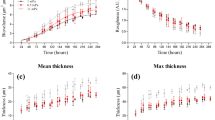Abstract
IT has been known for some time that dissociated sponge cells will aggregate if submitted to the proper conditions1–3. Wilson1,2, and later Galtsoff3, carried out experiments using dissociated cells of Microciona prolifera and Hymeniacidon heliophila and they described the stages of aggregation and the effects of various factors on the process. Later, de Laubenfels4 found this regenerative power in other species of sponges.
This is a preview of subscription content, access via your institution
Access options
Subscribe to this journal
Receive 51 print issues and online access
$199.00 per year
only $3.90 per issue
Buy this article
- Purchase on Springer Link
- Instant access to full article PDF
Prices may be subject to local taxes which are calculated during checkout
Similar content being viewed by others
References
Wilson, H., Bull. N.C. Bur. Fisheries, 30, 1 (1910).
George, W. C., and Wilson, H. V., Bull. N.C. Bur. Fisheries, 36, 130 (1919).
Galtsoff, P. S., J. Exp. Zool., 42, 183 (1925).
de Laubenfels, M. W., Ecol. Monogr., 17, 31 (1947).
de Laubenfels, M. W., Carnegie Inst. Pub. (Wash.), 467, 1 (1936).
Candelas, G. C., master's thesis (Duke Univ., 1959).
Hartman, W. D., Peabody Mus. Nat. Hist. Yale Univ. Bull., 12, 155 (1958).
Author information
Authors and Affiliations
Rights and permissions
About this article
Cite this article
CANDELAS, G., CANDELAS, G. A Criterion for Tolerance Investigations in Marine Sponges. Nature 201, 101–102 (1964). https://doi.org/10.1038/201101a0
Issue Date:
DOI: https://doi.org/10.1038/201101a0
Comments
By submitting a comment you agree to abide by our Terms and Community Guidelines. If you find something abusive or that does not comply with our terms or guidelines please flag it as inappropriate.



